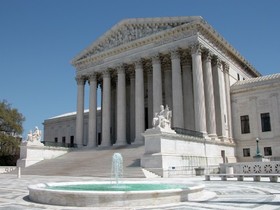Miers, we’re told, is an "originalist", someone who believe we ought to follow the intentions of the founding fathers who authored and advocated the passage of the Constitution.
That’s a problem . . . for Meirs.
Here’s what founding father Alexander Hamilton wrote in Federalist No. 76, in which he discusses why the Constitution gave the U.S. Senate the power to confirm – or reject – the President’s Supreme Court nominees (huge hat tip to David Sirota):
"To what purpose then require the co-operation of the Senate? I answer, that the necessity of their concurrence would have a powerful, though, in general, a silent operation. It would be an excellent check upon a spirit of favoritism in the President, and would tend greatly to prevent the appointment of unfit characters from State prejudice, from family connection, from personal attachment…"
It continues:
"[The President] would be both ashamed and afraid to bring forward, for the most distinguished or lucrative stations, candidates who had no other merit than that of coming from the same State to which he particularly belonged, or of being in some way or other personally allied to him, or of possessing the necessary insignificance and pliancy to render them the obsequious instruments of his pleasure."
Let’s let Sirota translate this: the framers thought that the mere existence of the U.S. Senate’s advise and consent powers should deter a President from nominating someone like Miers in the first place.

